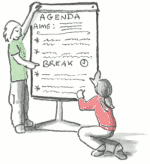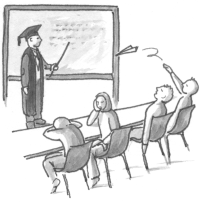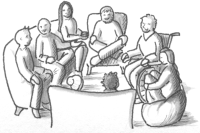
So you've been asked to run a workshop or skillshare?
Sharing knowledge and skills is an important part of contributing to our communities - and doing this means the wheel doesn't have to be continually reinvented. Perhaps more importantly, when we pass on skills to others, it is less likely that informal hierarchies will build up in our groups. In this guide we go through the basic steps that can help your workshop really work for you and your group.

Teacher is an 'expert'. Learning from few to many. Learners have less control of their learning.

Only expertise needed is facilitation. Knowledge drawn from the group and shared. Learners can set the agenda and share skills and knowledge
Preparation is the key to a good workshop, and it also helps you to be more confident. An agenda, or workshop plan, is a good way to make sure you're adequately prepared, and that you are being sensible about what you can cover in the time you have. It's always tempting to try to cram in too much, so be realistic about how much time you gives to activities, and be brutal about taking stuff out!
First of all work out your aims for the workshop - you may find it helps to write them out at the top of the agenda when you're working on it. Come back to these as you plan each activity. Does what you are planning to do help you achieve your workshop aims, or help the group relax and get to know each other? If not, you probably don't need the activity.
We're used to workshops that end up being presentations or group discussions. They're easier to organise, but with just a little bit of work we can help participants learn much more from our workshops - and enjoy them more too! People remember better if they are actively involved in their own learning, and if the workshop is interesting and dynamic.
Facilitating a workshop is about helping your group to share their own experiences. You can also add your own experiences and knowledge, but the key is that everyone is really involved.
Ask yourself whether someone in the group might already know or have some experience in your topic. If you think they might have, work out a way to get them to contribute - you could use an ideastorm or split your participants up into smaller groups and give them a task. Even if the knowledge comes mostly from you, you can plan games, role plays or practice sessions and chances for participants to reflect on their experiences to make your workshop more participatory.
We all learn in different ways so the best thing to do is to include different kinds of exercises and tools in your workshop. If you can get your participants listening, thinking, moving around and contributing at different points during your workshop the chances are that everyone will enjoy it!
It's a good idea to make sure that people move around every 90 minutes or so - a quick energiser, physical activity or just changing seats can help stop people nodding off!
Have a look at our briefing Facilitation Tools for Meetings and Workshops to get some ideas of how to vary your workshop.
If your workshop is about practical things (like how to do a news release or wire up a solar panel) then make sure to add enough time for people to try out their new skills. This helps build people's confidence and means they're more likely to remember what they've learnt, especially if they get the chance to try things out several times, not just the once.
When designing a workshop it's easy to forget the breaks - there always seems to be more to fit in than time will allow! But we're all human, both facilitators and participants, and when we're tired we don't function too well - and that includes understanding and remembering what the workshop is about.
If your workshop is two hours or less it's usually enough to make sure there is a possibility to get tea or coffee (or a trip to the pub) at the end. But if your workshop is longer than two hours then it's a good idea to schedule in a break every two to three hours, with an energiser in between.
This guide introduces some of the things you can do to make your workshop enjoyable and productive. If you want to find out more about facilitating workshops and the tools you can use have a look at our longer briefings on our website.
We also have guides on organising your meetings and making sure your meetings are accessible to those with physical disabilities.
(For more tools see our briefing Facilitation Tools for Meetings and Workshops)
Energisers get the group's energy up - important to help people concentrate. It can be as simple as having a stretch or changing seats, or maybe a simple game like animal sounds: assign everyone an animal then blindfold them. The challenge is to use animal noises in order to meet up with other animals of same species. Have at least three animals of each species.
Go-rounds: everyone takes a turn to speak without interruption or comment from other people. Go-rounds can be useful in workshops as an introduction, but also for you to get a sense of experience and skills already in the group. Make sure that everyone gets a chance to speak.
Ideastorming gathers a large number of ideas quickly. Start by explaining the issue. Ask people to say whatever comes into their heads as fast as possible - without censoring or discussion. This encourages creativity and frees energy. Write down all ideas for later discussion.
Parking space: when questions or suggestions come up that you can't deal with immediately 'park' them in the parking space (a large sheet of paper on the wall) and deal with it later. This allows you to stay focused but reassures participants that their questions will be answered.
Small Groups create safer spaces for people to contribute, so more people feel they can participate. Explain clearly what you want groups to do, write up the task where people can see it. If you want feedback at the end, ensure each group appoints a notetaker to report back.
Throw back to the group - don't feel you have to deal with all the questions. Where possible, let the group do the work. If someone asks a question see if someone in the group has an answer. You're still there to answer if no-one else can.

This PDF is in booklet format - print both sides of the paper and fold over to make a booklet.